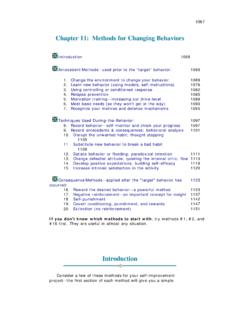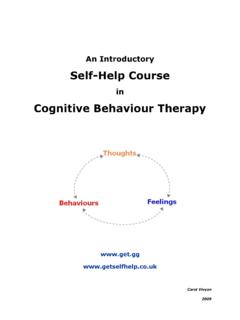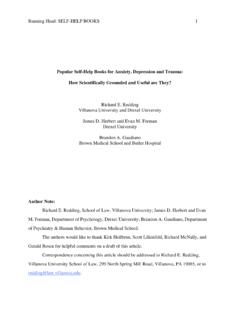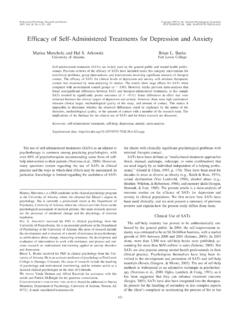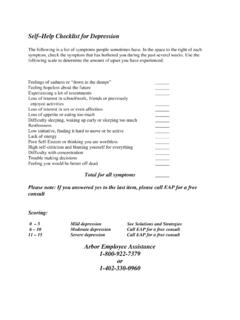Transcription of Happiness, Depression and Self-Concept
1 1 Chapter 6: happiness , Depression and Self-Concept Overview o Life history and gender factors in Depression o Signs of Depression happiness o What is meant by happiness ? o How do we become happy? o The interaction of happiness and Depression o Martin Seligman s Thesis on happiness o Forces affecting happiness and Depression o Suggestions for increasing happiness o Life circumstances in happiness o Promising routes to happiness Theories about the causes of Depression o The result of losses o Genetic-physiological-chemical factors o Poor social skills o Helplessness and hopelessness o How do you explain things?
2 O Negative views o Irrational ideas o Unreasonable thinking and faulty conclusions o self -critical withdrawal o Anger turned inward A fairy tale--Sooty o Guilt o Unmet dependency o Impossible goals or no goals o Shame o Lacking self -control o Summary of the causes of Depression ; How to use these theories Sad times of our lives-- o Death o Thoughts of suicide? Understanding suicide Barriers to getting treatment Rate of suicide by special groups Predicting suicide is hard Warning signs 2 Prevention and treatment (cautions about drugs) Intensive individual psychotherapy Useful information o self -Injury Injury or suicide?
3 Stopping self -injury (books and sites) o Loss of a relationship: divorce, breaking up, estranged from parent o Loneliness Reducing loneliness o Loss of status: failure and disappointment o Low Self-Concept : feeling inferior o The unhappy perfectionist and worrier o Guilt and regret What to do about destructive guilt o Shame Reducing shame o Boredom, apathy, and tiredness Methods for coping with o Dealing with Anti-depressants o Behavioral Methods-- self -observation, outcome analysis, self -evaluation, use rewards, change environment, observe payoffs, atone, get o Emotions--Level II.
4 Emotions (see chapter 12)relaxation, desensitization, express feelings o Skills--develop social skills, assertiveness, communication skills o Cognitive--build self -esteem, learn to be optimistic, attribution re-training, determinism, support groups o Unconscious--insight by reading, find underlying emotions o Final advice and suggested sources of information Overview We have all been sad. We have lost loves, dreams, pride, hopes, faith and on and on. Even periods of serious Depression , like Abe Lincoln's, are not rare events.
5 About 15% of us have been so depressed that it would have been wise to seek professional help (Wilcoxon, Schrader, & Nelson, 1976). But only one third of depressed people seek treatment (and they wait an average of 258 days to do so). Nevertheless, one third of all people seeing a psychiatrist are depressed. Depression is the first or second most frequent reason why people are admitted to the psychiatric wards in general hospitals (NIMH, 1971). A Presidential Commission on Mental Health estimated that 1 out of 5 of us (about 1 in 10 for males and 1 in 4 for females), will suffer from Depression sometime in our lives.
6 That is 20% in an 3 affluent country--the happiest country on earth; what about the poor countries? Women are twice as likely as men to be depressed; men get upset over jobs, women over relationships; married people in "not very happy relationships" are more likely to be sad than unmarried and divorced people. We will discuss these statistics later. Depression is not only fairly common, it can be very serious. Like Abe Lincoln as a young man, the misery can be so constant, so great, and seem so seemingly endless that one wants to die--to escape the pain.
7 In the one person every minute attempts suicide; one person every 24 minutes succeeds. There are more suicides than murders. Even among teenagers, it is third only to accidents and homicides. Almost 500,000 teenagers attempt suicide each year, not counting suicides disguised as "accidents" (McCoy, 1982). Suicide is so sad because it is a permanent, desperate solution to a temporary problem. What a loss to the world if Lincoln had killed himself. What a blow to each family in which an unnecessary death occurs.
8 My interest here is not so much with serious, disabling or suicidal Depression , usually called Clinical or Major Depression . Indeed, if sadness is disrupting your work and schooling--and you are thinking of ending it all--seek professional help immediately; you need more than self - help ; run no risk with your life. This "common cold of mental disorders" hospitalizes 250,000 a year, the most extreme cases. The "common cold" slows down many more of us and makes us gloomy. This chapter focuses on these less serious forms of Depression : sadness, disappointment, loneliness, self -criticism, low self -concepts, guilt, shame, boredom, tiredness, lack of interests, lack of meaning in life, etc.
9 Most of us are or will be somewhat depressed or disappointed and could use self - help . Overall, Depression costs the country more in treatment and lost work than heart disease. Are some people just naturally happy? It sometimes seems like it. Were they just born with the hard wiring that makes them happy, cheerful, active, social, and optimistic? Maybe. It might have been an inherited family trait but happiness happens in other ways apparently. For instance, in many cases happy people are different from anyone else in the family; indeed, some had an unpleasant, neglectful, abusive family which they had trouble understanding but learned to tolerate.
10 We don t know all the ways to become happy yet. Some chronically happy people are referred to by some doctors as having hyperthymia, similar to but the opposite of dysthymia (chronic, mild Depression ). See Richard Freiman s 2002 article in the New York Times ( ). Maybe some people just have more serotonin in their brains. Well, that sounds simple but it appears more complex than that because antidepressants increase serotonin within days but it takes weeks to reduce the Depression . Research has also shown that giving an 4 antidepressant, such as Paxil, to normal people, who are not depressed, does not increase their happiness (it did reportedly reduce their anger slightly and increase their sociability).

